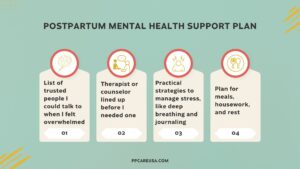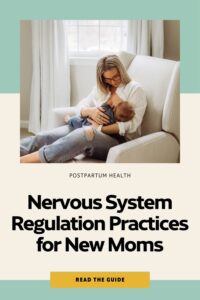Becoming a mom is one of the most profound transformations a woman can go through. But for many of us, the postpartum period isn’t just sleepless nights and baby snuggles—it’s also a rollercoaster of emotions, anxiety, and even rage.
I didn’t expect to struggle with postpartum anxiety (PPA) and postpartum rage, but looking back, I now recognize the signs. I wish I had known that my feelings of overwhelm, irritability, and uncontrollable anger weren’t just “normal new mom stress”—they were symptoms of a real, treatable condition.
If I could go back, here’s what I would do differently to support my mental health during postpartum. If you’re a new mom struggling right now, I hope these insights help you feel seen and remind you that healing is possible.
1. Advocate for Myself Sooner
I spent months suffering in silence, believing that my anxiety and rage were just part of motherhood. I thought I had to push through it and that admitting I was struggling meant I wasn’t a good mom.
The truth? Postpartum anxiety and rage are real, and they deserve to be taken seriously. I wish I had spoken up sooner—whether to my partner, a close friend, or a healthcare provider.
If you’re feeling overwhelmed, anxious, or out of control, please don’t wait. Your feelings are valid, and you deserve support.
2. Get My Hormones & Nutrient Levels Checked
Nobody told me how much hormones and nutrient deficiencies could impact my postpartum mental health. After pregnancy and birth, your body goes through major shifts—estrogen and progesterone drop, while stress hormones like cortisol can spike.
Plus, key nutrients like magnesium, B vitamins, vitamin D, and iron can become depleted, making anxiety and mood swings even worse.
I wish I had done lab work early on to check for imbalances. Knowing what was happening inside my body could have given me real answers instead of feeling like I was just “losing it.”
3. Ask for (and Accept) More Help
I felt like I had to do everything myself—because that’s what “good moms” do, right?
Wrong.
Trying to do it all on your own leads to burnout, resentment, and exhaustion. I wish I had let go of the guilt and asked for more help with meals, household tasks, and even holding the baby so I could rest.
If someone offers to help you, say yes. They wouldn’t offer if they didn’t mean it.
4. Prioritize Sleep Over “Getting Things Done”
I remember staying up late to clean, fold laundry, and answer messages—because I felt like I had to “keep up” with everything.
But the truth is, nothing is more important than sleep in the postpartum period. Sleep deprivation fuels anxiety, makes mood swings worse, and leaves you emotionally drained.
I wish I had let go of the pressure to be productive and prioritized rest instead. The dishes can wait—your well-being can’t.
5. Have a Postpartum Mental Health Plan in Place
I prepared for birth. I read the books, packed my hospital bag, and made a registry.
But I didn’t prepare for my own mental health.
Looking back, I wish I had created a postpartum support plan with:
- A list of trusted people I could talk to when I felt overwhelmed
- A therapist or counselor lined up before I needed one
- Practical strategies to manage stress, like deep breathing and journaling
- A plan for meals, housework, and rest
Don’t wait until you’re in crisis mode—have a plan in place to support your mental health from day one.

6. Ditch the Guilt
Mom guilt is so real.
I felt guilty for struggling. I felt guilty for needing breaks. I felt guilty for not feeling happy all the time.
But you don’t have to be perfect to be a good mom. Your emotions, your struggles, and your need for rest do not define your worth as a mother.
I wish I had shown myself more compassion and let go of the guilt sooner.
7. Take Breaks Without Guilt
I used to think I had to be with my baby 24/7. I felt like any time spent on myself was selfish.
But the truth is, taking breaks makes you a better mom.
A 5-minute walk, a solo trip to Target, or even just sitting in a quiet room alone can help reset your nervous system.
Next time you feel overwhelmed, give yourself permission to step away and breathe.
8. Talk About It Openly
I was afraid to tell people I was struggling because I thought they’d judge me.
But when I did open up, I realized how many other moms had been through the same thing.
Postpartum anxiety and rage are common—but they’re not often talked about. Sharing your experience can help break the stigma and make other moms feel less alone.
9. Try Nervous System Regulation Practices
When anxiety and rage took over, I felt completely out of control.
What I didn’t know at the time was that simple nervous system regulation techniques could have helped me feel calmer and more in control.
Some things I wish I had tried sooner:
- Deep belly breathing (inhale for 4 seconds, hold for 4, exhale for 8)
- Cold therapy (splashing cold water on my face or holding an ice pack)
- Progressive muscle relaxation (tensing and releasing muscles)
- Grounding exercises (naming 5 things I can see, 4 I can touch, 3 I can hear, 2 I can smell, 1 I can taste)
These simple techniques can literally rewire your brain’s stress response. If you’re struggling, try incorporating one into your daily routine.
10. Remember That Postpartum Doesn’t Last Forever
When I was in the thick of postpartum anxiety, it felt like I’d always feel that way. Like I was broken. Like I’d never be myself again.
But the truth? Postpartum is temporary.
With time, the right support, and intentional self-care, you will start to feel like yourself again.
If you’re in the trenches right now, hold on. We’ve been there and treated thousands of mamas like you. You will get through it, with the right support.
Final Thoughts
If I could go back, I would tell myself:
- You are not failing. Postpartum anxiety and rage are not your fault.
- You deserve support. Speak up and ask for help when you need it.
- You are not alone. Other moms have been there too, and we’re here for you.
If you found this helpful, please share it with another mama who needs to hear it. And if you’re struggling, know that support is out there—you don’t have to do this alone.
Pin This for Later:



Postnatal Depletion
Meet the Team
Our Services
Supplements
A virtual healthcare clinic that helps postpartum mamas recover from postnatal depletion syndrome with a holistic approach.

Get in touch